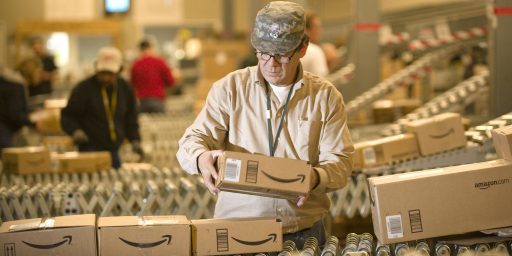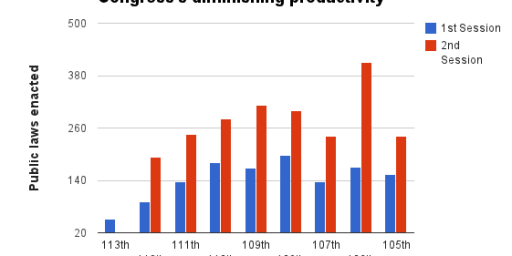The End of 9 to 5
John Wesley (a different one; the theologian passed on some years back) argues that the 9-to-5 office worker will become a thing of the past, as businesses come to realize that it is an anachronism of the manufacturing age. As most of us have worked in an office know, we lose the ability to concentrate after a couple of hours staring at a computer and it’s the rare day indeed when eight hours at the office translates into anything near eight hours of productive work.
When workers reach the low energy part of the cycle, they can’t recharge with a non-work activity. The only option is office purgatory. You can’t be highly productive because you’re mentally fatigued, but you can’t recharge because the 8 hour work day requires the appearance of constant productivity. The result is millions of unproductive workers trapped at their desks when they’d rather be doing something else.
So, what to do? Wesley argues for more telecommuting and similar alternative arrangements.
The obvious solution to this problem is planning around the mental energy cycle by breaking the work day into multiple segments. The traditional office setting doesn’t accommodate this because there are few available recharge activities. People can’t do household chores, run errands, or engage in recreational activities without leaving the workplace.
[…]
The solution that makes the most sense is a remote work arrangement because it reduces employer costs and allows employees to adjust their work schedule to their mental energy cycle. When a worker becomes mentally fatigued, they can go off the clock and engage in recharge activities that are personally productive like exercise or relaxation. When energy returns, the worker can start working again at a high level, effectively cutting out the low productivity period of the cycle. Employers don’t pay for unproductive time and employees get to work in a more natural pattern that adjusts to their personal lives.
Of course, getting paid for unproductive time is a chief benefit of office work, as is regularity of schedule. Having worked from home for the past eleven months, I do find that I’m generally more productive as a whole because I can run errands during the day so as to minimize crowds and traffic and otherwise take advantage of time that I would be at a low energy ebb from sitting too long in front of the computer.
At the same time, however, the lack of structure and external deadlines sometimes makes me less efficient. So, to, is the inability to segregate home and work life, creating the expectation, not just the ability, that I will take care of household matters during the day when I would prefer to be concentrating on work.
Wesley observes that,
There is also the argument that people need to collaborate in person. This is steadily becoming less essential. Most office communications are already done through email or instant messager. Face to face meetings are certainly necessary, but for the vast majority of lower and mid level employees meetings are the exception and could be conducted via phone/video conference or condensed into one or two days a week.
I know of at least one case where a knowledge company has moved in the opposite direction. Reason magazine has been essentially run out of editor-in-chief Nick Gillespie’s home for years with all of its editors and staff writers working from home. They recently purchased an office in downtown D.C. Partly, this was because they want to have more of a “presence” in town and have a central place to meet various interview subjects, host seminars, and otherwise engage in Washington activity. Partly, though, they want to give their writers the ability to meet face-to-face on a regular basis and to get the energy and synergy that comes from that. They’re still allowed to telecommute as often as they’d like, but now they have a choice.
Indeed, one of the things I miss from my days teaching college or working in the publishing business is the day-to-day human interaction with others in my field. I’m happy not to be tied into an inflexible 9-to-5 schedule where most of my daily activities are at the behest of others and I “meet” a wider variety of smart people interested in public affairs online than I ever did in real space. But e-mail and blog comments sections are not a complete substitute, either.






As much sense as more telecommuting would make for many workers, I expect that the trends will be in a different direction: towards job protection. If you don’t have to be there physically, why can’t you be in India?
The employers may see it just the other way ’round, of course.
What shouldn’t be missed is the traditional eight-hour work day expanding. With a company assigned cell phone or (worse) Black Berry you’re always expected to be in touch or at least you feel like you’re expected.
I’ve done the whole “on call 24/7” bit before, it was one of the worst times for me and for my family. It’s now a deal breaker for me when looking at a job opportunity, no matter what the salary is.
I’m in a non 9-to-5 situation (freelance technician). While I don’t have to worry about the grind of the same thing, day to day, I do have situations where I have to work (for example) 6 AM to 9 PM for a few days, then have a week or more off.
Luckily, it’s not the same thing all day (most days), or the schedule would be impossible. Actually, that’s probably the best part, since the variety of tasks can be pretty extreme (unload large trucks, set up a half-million dollars of video equipment, fiddle with computers, schmooze with clients, help decorate sets, go home for the day).
My experience is from a small country on the other side of a large ocean but, there is a huge trend in the UK towards working at home. The way that people are dealing with work at home over here is by building offices in their gardens.
I think this trend has occurred because of the high cost of property over here, plus everyone has tiny houses. [We are supposed to be a crowded island, but actually only 5% of the land mass of Great Britain has buildings on it.]
However, this arrangement works for a lot of people, plus, you can have someone working there with you, if appropriate. – Helps cut out the isolation, as long as the companion hasn’t got any horrible habits!
I have to confess that I know about this because my partner, who is an architect and I run a niche business designing and selling garden offices.
The pluses are you get to go out into the world and meet lots of independent thinking people who have decided to set up their work in their garden!
One of the benefits of these grand economic changes is the added variety to jobs. We develop new skills, meet new people, and do new things. In a few generations the exception will be the employee doing the same thing day after day. Like their varied media options future workers will want variety as well as a paycheck.
Good god, Shoshana Zuboff from Harvard Business School wrote about this 20 years ago.